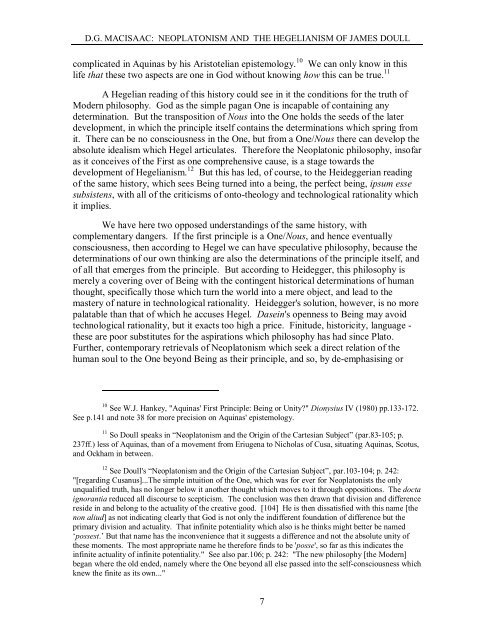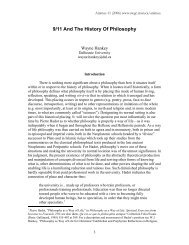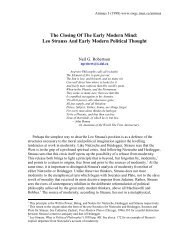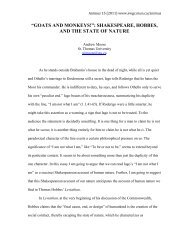Neoplatonism And The Hegelianism Of James Doull1
Neoplatonism And The Hegelianism Of James Doull1
Neoplatonism And The Hegelianism Of James Doull1
You also want an ePaper? Increase the reach of your titles
YUMPU automatically turns print PDFs into web optimized ePapers that Google loves.
D.G. MACISAAC: NEOPLATONISM AND THE HEGELIANISM OF JAMES DOULLcomplicated in Aquinas by his Aristotelian epistemology. 10 We can only know in thislife that these two aspects are one in God without knowing how this can be true. 11A Hegelian reading of this history could see in it the conditions for the truth ofModern philosophy. God as the simple pagan One is incapable of containing anydetermination. But the transposition of Nous into the One holds the seeds of the laterdevelopment, in which the principle itself contains the determinations which spring fromit. <strong>The</strong>re can be no consciousness in the One, but from a One/Nous there can develop theabsolute idealism which Hegel articulates. <strong>The</strong>refore the Neoplatonic philosophy, insofaras it conceives of the First as one comprehensive cause, is a stage towards thedevelopment of <strong>Hegelianism</strong>. 12 But this has led, of course, to the Heideggerian readingof the same history, which sees Being turned into a being, the perfect being, ipsum essesubsistens, with all of the criticisms of onto-theology and technological rationality whichit implies.We have here two opposed understandings of the same history, withcomplementary dangers. If the first principle is a One/Nous, and hence eventuallyconsciousness, then according to Hegel we can have speculative philosophy, because thedeterminations of our own thinking are also the determinations of the principle itself, andof all that emerges from the principle. But according to Heidegger, this philosophy ismerely a covering over of Being with the contingent historical determinations of humanthought, specifically those which turn the world into a mere object, and lead to themastery of nature in technological rationality. Heidegger's solution, however, is no morepalatable than that of which he accuses Hegel. Dasein's openness to Being may avoidtechnological rationality, but it exacts too high a price. Finitude, historicity, language -these are poor substitutes for the aspirations which philosophy has had since Plato.Further, contemporary retrievals of <strong>Neoplatonism</strong> which seek a direct relation of thehuman soul to the One beyond Being as their principle, and so, by de-emphasising or10 See W.J. Hankey, "Aquinas' First Principle: Being or Unity?" Dionysius IV (1980) pp.133-172.See p.141 and note 38 for more precision on Aquinas' epistemology.11 So Doull speaks in “<strong>Neoplatonism</strong> and the Origin of the Cartesian Subject” (par.83-105; p.237ff.) less of Aquinas, than of a movement from Eriugena to Nicholas of Cusa, situating Aquinas, Scotus,and Ockham in between.12 See Doull's “<strong>Neoplatonism</strong> and the Origin of the Cartesian Subject”, par.103-104; p. 242:"[regarding Cusanus]...<strong>The</strong> simple intuition of the One, which was for ever for Neoplatonists the onlyunqualified truth, has no longer below it another thought which moves to it through oppositions. <strong>The</strong> doctaignorantia reduced all discourse to scepticism. <strong>The</strong> conclusion was then drawn that division and differencereside in and belong to the actuality of the creative good. [104] He is then dissatisfied with this name [thenon aliud] as not indicating clearly that God is not only the indifferent foundation of difference but theprimary division and actuality. That infinite potentiality which also is he thinks might better be named‘possest.’ But that name has the inconvenience that it suggests a difference and not the absolute unity ofthese moments. <strong>The</strong> most appropriate name he therefore finds to be 'posse', so far as this indicates theinfinite actuality of infinite potentiality." See also par.106; p. 242: "<strong>The</strong> new philosophy [the Modern]began where the old ended, namely where the One beyond all else passed into the self-consciousness whichknew the finite as its own..."7
















